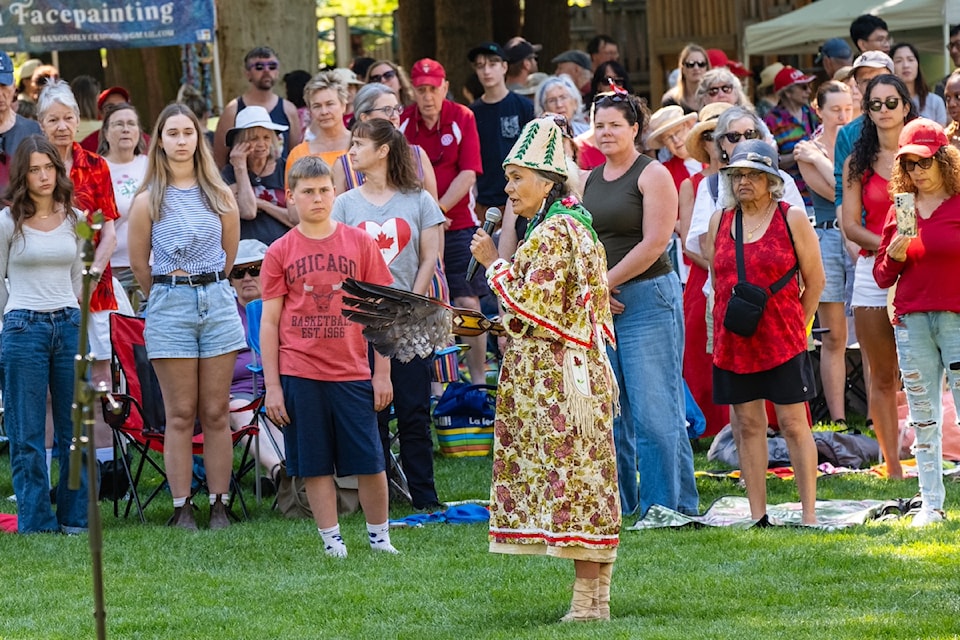Top Stories
Sinixt Confederacy Files Lawsuit Against B.C. Government Over Land Rights

The Sinixt Confederacy, representing a tribe based in the United States, has initiated legal action against the provincial government of British Columbia (B.C.) for failing to consult with them on critical land and education issues. This lawsuit, announced on Wednesday, includes two constitutional challenges to be filed at the Supreme Court of B.C. in Nelson.
The confederacy, part of The Confederated Tribes of the Colville Reservation in Washington, claims that a notice from the B.C. government in March indicated it would only notify the Sinixt of decisions affecting their territory rather than engage in meaningful consultations. Traditional Sinixt territory spans north from near Kettle Falls, Washington, through the West Kootenay region to the northern tip of the Columbia River, just north of Revelstoke. This area is contested by the Cranbrook-based Ktunaxa Nation and the Syilx Okanagan Nation, the latter of which asserts it represents the Sinixt in Canada and has received backing from Premier David Eby.
Jarred-Michael Erickson, chairman of both the Sinixt Confederacy and the Colville Tribes, expressed concerns in an interview with the Nelson Star. He emphasized that the Sinixt should receive the same treatment as other Indigenous peoples in Canada, which includes involvement in discussions regarding logging, fish, wildlife, water, and archaeological matters within their ancestral lands. “We bring a lot to the table where we have a lot of knowledge, but that currently isn’t being incorporated or our concerns aren’t being met. Notification isn’t the same as consultation,” he stated, asserting the tribe’s rights as a First Nation.
The legal action follows a significant ruling from the Supreme Court of Canada in 2021, which affirmed the rights of American hunter Rick Desautel, who had been charged for hunting out of season as a non-resident. The court recognized the Sinixt as an Aboriginal people of Canada, a status that has yet to translate into formal treaty rights or recognition from the federal government.
Despite this landmark decision, the Sinixt Confederacy has reported a lack of progress. Notably, in June 2023, the provincial government excluded the Sinixt from financial compensation related to the Columbia River Treaty, which allocates approximately $6 million annually over four years to the Ktunaxa, Secwépemc, and Syilx Okanagan Nations. This exclusion is viewed by Erickson and the Sinixt as a neglect of the historical injustices stemming from the 1846 border creation that divided their territory. Most Sinixt were forced to relocate to the Colville reservation in northern Washington, and in 1956, the Canadian government controversially declared them extinct.
Erickson criticized the current treatment of the Sinixt, stating, “We’re being treated essentially as a second-class native or a second-class citizen. If you’re really looking at truth and reconciliation, we should serve as an example of how to do it right and not repeat history.”
In addition to the land rights issue, the Sinixt Confederacy is also challenging amendments to the School Act that prevent them from participating in Indigenous education councils. This exclusion is based on their lack of recognition as a First Nation under the federal Indian Act. Erickson voiced concerns that their history is not accurately represented in B.C. schools. “We want to make sure our voice is being heard, that it’s being taught in our schools the correct history from Sinixt people,” he asserted.
The Sinixt Confederacy’s lawsuit highlights ongoing challenges faced by Indigenous groups regarding consultation, representation, and acknowledgment of their rights. As the case progresses through the legal system, it underscores the need for a broader dialogue about Indigenous rights and historical recognition in Canada.
-

 Education5 months ago
Education5 months agoBrandon University’s Failed $5 Million Project Sparks Oversight Review
-

 Science6 months ago
Science6 months agoMicrosoft Confirms U.S. Law Overrules Canadian Data Sovereignty
-

 Lifestyle5 months ago
Lifestyle5 months agoWinnipeg Celebrates Culinary Creativity During Le Burger Week 2025
-

 Health6 months ago
Health6 months agoMontreal’s Groupe Marcelle Leads Canadian Cosmetic Industry Growth
-

 Education5 months ago
Education5 months agoNew SĆIȺNEW̱ SṮEȽIṮḴEȽ Elementary Opens in Langford for 2025/2026 Year
-

 Science6 months ago
Science6 months agoTech Innovator Amandipp Singh Transforms Hiring for Disabled
-

 Technology6 months ago
Technology6 months agoDragon Ball: Sparking! Zero Launching on Switch and Switch 2 This November
-

 Business2 months ago
Business2 months agoEngineAI Unveils T800 Humanoid Robot, Setting New Industry Standards
-

 Technology3 weeks ago
Technology3 weeks agoDigg Relaunches as Founders Kevin Rose and Alexis Ohanian Join Forces
-

 Top Stories2 months ago
Top Stories2 months agoCanadiens Eye Elias Pettersson: What It Would Cost to Acquire Him
-

 Education6 months ago
Education6 months agoRed River College Launches New Programs to Address Industry Needs
-

 Business5 months ago
Business5 months agoRocket Lab Reports Strong Q2 2025 Revenue Growth and Future Plans
-

 Technology6 months ago
Technology6 months agoGoogle Pixel 10 Pro Fold Specs Unveiled Ahead of Launch
-

 Education6 months ago
Education6 months agoAlberta Teachers’ Strike: Potential Impacts on Students and Families
-

 Technology4 months ago
Technology4 months agoDiscord Faces Serious Security Breach Affecting Millions
-

 Business6 months ago
Business6 months agoBNA Brewing to Open New Bowling Alley in Downtown Penticton
-

 Science6 months ago
Science6 months agoChina’s Wukong Spacesuit Sets New Standard for AI in Space
-

 Lifestyle4 months ago
Lifestyle4 months agoCanadian Author Secures Funding to Write Book Without Financial Strain
-

 Business6 months ago
Business6 months agoNew Estimates Reveal ChatGPT-5 Energy Use Could Soar
-

 Business1 month ago
Business1 month agoNvidia and AMD CEOs Unveil AI Innovations at CES 2026
-

 Business4 months ago
Business4 months agoHydro-Québec Espionage Trial Exposes Internal Oversight Failures
-

 Top Stories4 months ago
Top Stories4 months agoPatrik Laine Struggles to Make Impact for Canadiens Early Season
-

 Business6 months ago
Business6 months agoDawson City Residents Rally Around Buy Canadian Movement
-

 Technology6 months ago
Technology6 months agoFuture Entertainment Launches DDoD with Gameplay Trailer Showcase










